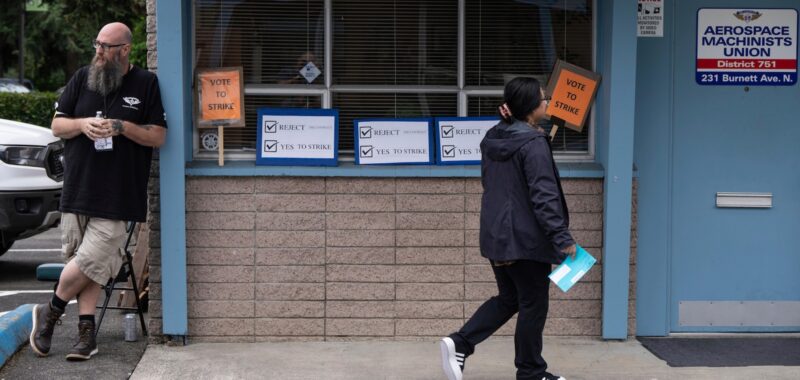A strike by the 33,000 factory workers who assemble some of Boeing’s best-selling planes would come as another blow to a company whose bottom line and reputation have taken plenty of hits this year.
Jan. 5 – A fuselage panel covering an unused emergency exit blows off an Alaska Airlines Boeing 737 Max 9 seven minutes after takeoff from Portland, Oregon. The blowout leaves a gaping hole in the jetliner. The rapid loss of cabin pressure created decompression so violent that it blew open the cockpit door and tore off the co-pilot’s headset. Oxygen masks drop from the ceiling and pilots made a safe emergency landing with none of the 171 passengers and six crew members seriously injured.
Jan. 6 – The Federal Aviation Administration grounds all 737 Max 9s in the U.S.
Jan. 24 — The FAA clears airlines to resume flights once they have completed mandatory inspections of their fleets’ door plugs but caps production of new Boeing 737 Max aircraft until the agency is satisfied required quality control procedures are being followed.
Feb. 6 – The National Transportation Safety Board says four bolts that help secure door plugs to the frames of Max 9s were missing from the Alaska Airlines plane before it took off from Portland. The plug, which is normally sealed, was opened for repair work, then reclosed in a Boeing factory.
Feb. 26 – A report Congress ordered in 2020 after two deadly crashes involving Boeing 737 Max jetliners identifies problems in the company’s safety culture. Outside experts say workers fear raising quality issues with managers without retaliation.
March 4 – The Federal Aviation Administration says an audit of 737 Max manufacturing turned up “multiple instances” of Boeing and key supplier Spirit AeroSystems failing to make sure quality standards were met.
March 25 – Boeing CEO David Calhoun says he will step down by the end of the year. Two others top officials leave as part of a management shakeup.
April 4 – Alaska Airlines says Boeing paid it $160 million in “initial compensation” for the door plug blowout and the related grounding of the carrier’s Max 9 fleet in January.
April 17 – The Senate holds back-to-back hearings on whether Boeing is compromising safety in its manufacturing. An engineer testifies that the aircraft company, in rushing to produce as many planes as possible, is taking shortcuts that could lead to jetliners breaking apart. Members of the expert panel that produced the February report share their findings about alleged retaliation against whistleblowers.
May 14 – The Justice Department accuses Boeing of violating a settlement that allowed the company to avoid criminal prosecution after deadly crashes involving its 737 Max aircraft in 2018 and 2019 killed 346 people.
June 5 – A pair of NASA test pilots blast off aboard Boeing’s Starliner capsule for the International Space Station, the first to fly the new spacecraft after years of delays. Butch Wilmore and Suni Williams were expected to spend just over a week at the orbiting lab, but problems with the capsule’s propulsion system prompt NASA and Boeing to delay the flight home several times.
June 18 – Boeing CEO Calhoun apologizes to the families of crash victims while appearing before a Senate subcommittee for questioning. During the contentious hearing, some senators accuse him of placing profits over safety, failing to protect whistleblowers and getting paid too much.
July 7 – Boeing agrees to plead guilty to conspiracy to defraud the U.S. government for misleading regulators who approved pilot-training standards for the Max. Relatives of some of the crash victims say they think the plea deal is too lenient and will ask a judge to reject it.
July 31 – Boeing names aerospace industry veteran Robert “Kelly” Ortberg as its next chief executive. The same day, the company reports a second-quarter loss of more than $1.4 billion on falling revenue.
Aug. 20 – Federal safety officials require inspections of cockpit seats on Boeing 787 Dreamliners after one of the jets goes a dive when the captain’s seat lurched forward without warning and disconnected the plane’s autopilot system.
Aug. 24 – NASA decides it’s too risky to bring two astronauts back to Earth in Boeing’s Starliner capsule and the pair will have to wait until next year for a ride home with SpaceX, turning what should have been a weeklong test flight into a journey lasting more than eight months.
Sept. 8 – Boeing and its largest union say they reached agreement on a new contract that would give 33,000 aircraft assembly workers 25% pay raises over four years and guarantee the company’s next new jetliner would be built by unionized labor in Washington state. Workers immediately criticize the offer.
Sept. 12 – Members of the International Association of Machinists and Aerospace Workers vote on whether to accept the proposed contract and if not, whether to go on strike starting Friday.

